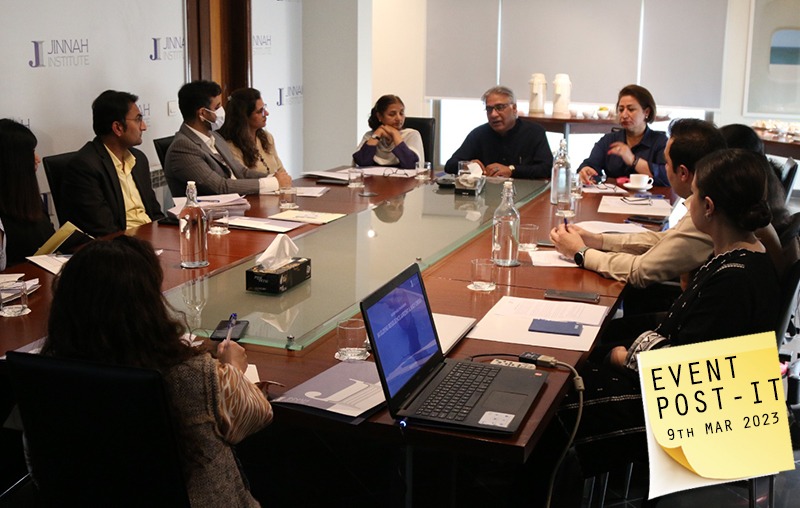Roundtable
Building Resilience Amidst a Poly Crisis
Date: March 20, 2023
Any projection of crisis resilience is Pakistan is foregrounded by the ongoing economic emergency, which has reversed human development gains and compounded vulnerability, stated experts at Jinnah Institute’s roundtable discussion titled ‘Building Resilience Amidst a Poly Crisis’. They discussed ways in which resilience can be programmed through interventions in human rights, social protection and climate adaptation.
They observed that ‘resilience’ ran the risk of being turned into a development catch-phrase, added to a long list of redundant approaches that are not backed by evidence. While it is clear that Pakistan’s polycrisis needs composite overhauls across several policy domains, including the economy and governance, the approaches at work are still coursing path dependent sectoral interventions that address each challenge separately. There is a dire need for political repositioning of resilience and its translation into action from a mere ‘buzzword’ in party manifestos, and understanding the intersectionality of each policy action.
They argued that discussing ‘resilience’ without addressing vulnerability creates a false impression that communities have ‘bounced back’ from disaster, whereas many never return to their flawed origin. Resilience assessments in post-disaster scenarios struggle to answer how much time and resource it takes for vulnerable households to overcome their challenges and demonstrate rehabilitation. Too many households are pushed to the point of no return, and never make it back. Mere survival should not be confused with resilience, they added.
Resilience is a common agenda between the state and civil society. However, the state’s preoccupations with foreign policy have come at the cost of genuine development and minority rights, participants stated. The state has never undertaken meaningful reform that benefits its citizens, nor given the full measure of citizenship to many marginalized cohorts. In this respect, building resilience is also a political project that must “heal and reconcile” society before embarking on social cohesion. The struggle for reform must not get sidetracked by short-term resilience frameworks, that can serve as artificial constructs, to the detriment of overturning deep set exclusions.
They felt that the intelligentsia has an incoherent mechanism of designing solutions based on theoretical approaches rather than relying on data, and this has repeatedly led to insufficient impact. Civil society actors too have traditionally relied on advocacy at the federal level, often overlooking engagement with provincial or district bodies who are the first responders for service delivery. Any attempt at building resilience will need a hard look at what we have done wrong in the past, and inadvertently reinforced marginalization, they stated.
A major domain for building resilience is new-age skills among young professionals. Analysis of Pakistan’s skills profile reveals that contemporary professional skills are not being developed for domestic or international markets. Participants felt that the opportunity to reap demographic dividends has largely passed due to an untapped youth bulge that is under-skilled and unemployed. Given the current challenges the country faces, urgent investment in human capital is needed to address this situation; a bottom-up approach of working with local governance and designing localized youth development projects, as well as consistent monitoring and evaluation, can yield results. They pointed out that youth development provides an intersection that combines support for vulnerable social groups, such as ethnic and religious minorities, climate and refugee migrants, and other marginalized groups.
Climate resilience has come into sharp focus after last year’s megaflood, whose impact on vulnerable communities is still being felt in underdeveloped districts. Climate resilience may well be addressed in updated policy frameworks – and there are several the government has embarked upon – but actual outcomes of resilience in individuals’ and communities’ lives are yet to be seen, and may evolve from enabling indigenous adaptation practices. Participants recommended that civil society actors need to cultivate donors’ interest in more community owned projects with an element of government-community partnership, as these models provide evidence of sustainability using local resources. They added that dense policy debates, such as climate change, need to be made easily understandable to decision-makers as well as communities to facilitate adaptation.
